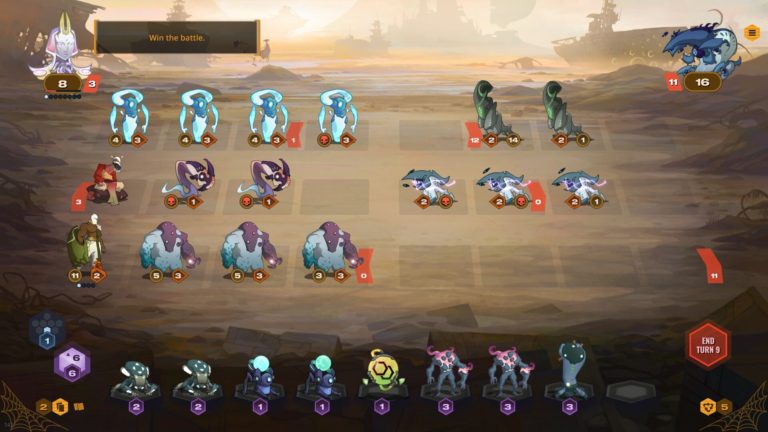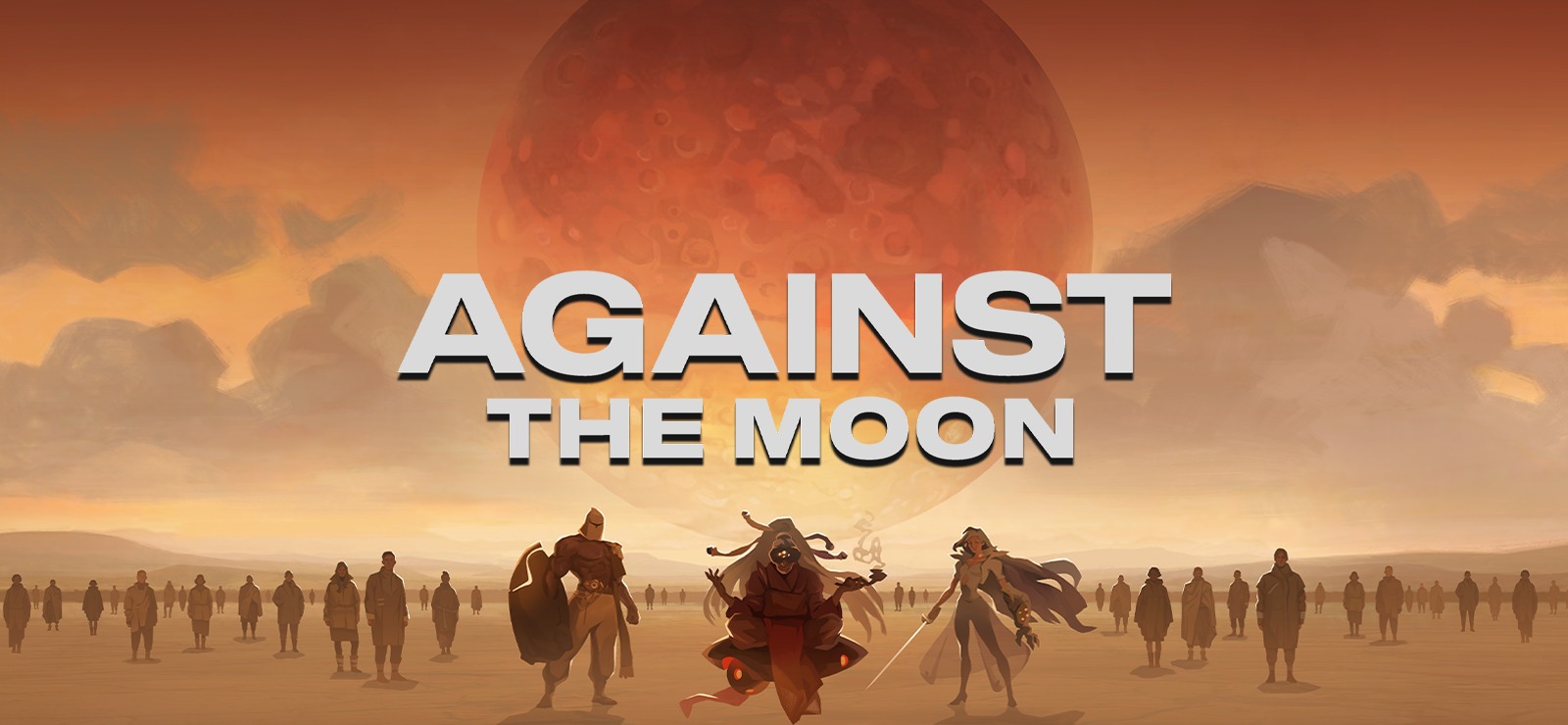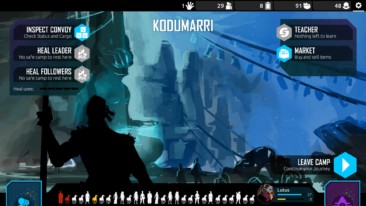Against the Moon from Code Heretic
You know that thing where you are learning a game and the designers want to tell you that there are Fsdfksdhrts but that really mean action points, and there are bad guys but they’re called S445sdkfds, and there there is the special attack you have, and it’s called the KF74DDM&#&$$s?
Against the Moon is a lot like that. The Endless universe does this a lot, too, and has been awarded for its wild originality, but I prefer when my mechanics – be they in digital or tabletop games – be named what they are, letting the flavor stuff stay on the flavor stuff side of the plate.
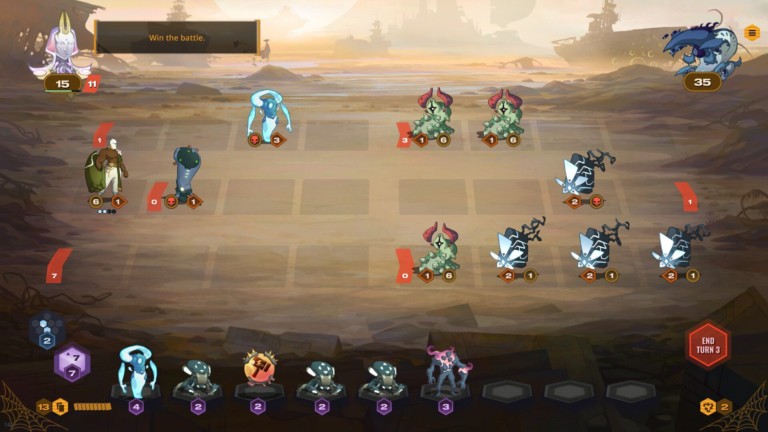
Would Combat Mechanics by Any Other Name Smell as Sweet?
Besides which, Against the Moon at first glance is an Ironclad Tactics-like that shares some of the aesthetic of Supergiant Games‘ Pyre (which I played a lot of, but which for some reason we never reviewed at IGR).
I can see all the influences here because this game is so close to the epicenter of my wheelhouse: the standard Magic: The Gathering thing where you hit over the minions and defenses at the boss to win the round. (See also basically any CCG that followed, like Slay the Spire, Monster Train, Deck of Ashes, etc.)
I can almost hear InfinityWaltz asking me if this is another one of those games where, like Into the Breach he thought I was going to love, only to have me react with a “meh” in the end.
Well, turns out that despite many roadblocks for me, there are a lot of things I ended up liking about this title and continued to think about after I left it. So let’s get into the dirt:
Against the Misuse of Language (and Other Gripes)
In Against the Moon, the thematic story framework wrapped around the lane-based combat feels much the same: standard fare with weird names to make it sound more exotic than it really is (and please stop with the unskippable text cutscenes). Human hubris led to the creation of abominations that have now spiraled out of control (I think Mary Shelley covered this 120 years ago).
Also, I feel exhausted figuring out what all the novel syntax means. What is a “script?” Is that a dev term? Is a “script” like a spell?
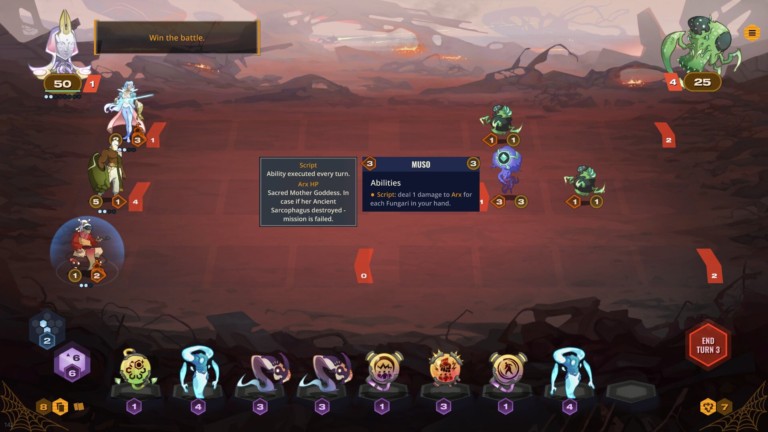
In addition to the cumbersome naming of things, there are slight production quality annoyances, like words mispronounced by the mediocre voice-over actor. Maybe they’re a friend of the devs – or one of the devs themselves – and they give it their best, but it just feels forced.
And typos. Why? Why are there typos? Please find a copy editor and spell-checker. It’s so egregious to have typos in a finished game. You wouldn’t send a resume that contains typos, and you shouldn’t have constant typos in a game that has been released in exchange for fiat.
Honestly, I feel like I could spend the same time learning a new language. Cantonese? Hungarian? Am I being too grouchy?
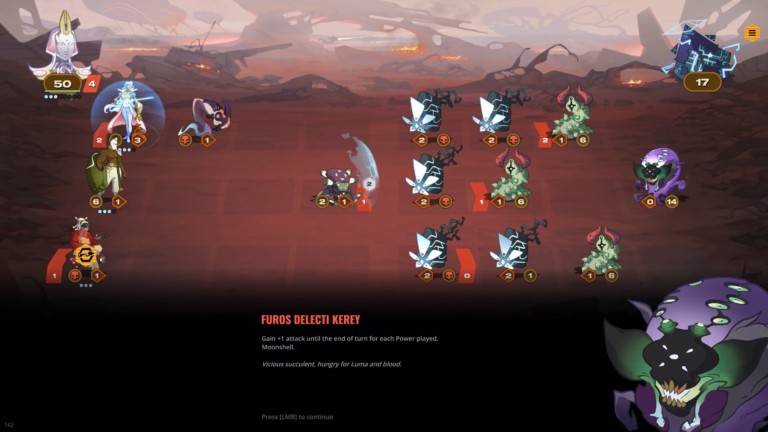
Rogue-lite? Not Quite
Also, why does this have the term “Rogue-lite” all over its marketing? Please stop with the Rogue everything. It is what it is. It’s a lane-based, turn-taking, combat game with some randomization. Rogue was a procedurally generated ASCII-based dungeon crawler that featured perma-death, rampant complexity, and so many angry emus. (As an aside, I have been playing Dwarf Fortress again lately, and believe me, that ASCII stuff can get head-scratchingly profound as the result of its emergent complexity.)
I didn’t like that my health is brown but my attack number is red. That seemed backward to me. Also, the fact that my health is in a circle but my attack appears to be in a sideways shield symbol was odd. Mousing over any of the symbols is no help; you just have to figure them out by way of deduction.
Maybe it was supposed to look like an arrow, pointing at the enemy, but really, it’s just more of the same thing, where elements that should be obvious and self-explanatory are once-removed and abstracted just to make mundane things seem more interesting than they need to be. The same goes for the purple diamond, which displays the unit’s cost. Clicking the help menu offers no insight.
In case I haven’t yet drilled this point home, the UX leaves a lot to ask for.
Lunar Lunacy
On the plus side: the score is pretty cool: brooding, mysterious, a cross between organic beasts and giant churning metal chambers fused together into aural horror shows, creeping in the shadows. Traces of cyberpunk ARPs and Zimmer horn-drops in another of those anachronistic primitive/future mash-ups we see so much these days.
The illustrative graphics and character designs are really cool and match up well with the interesting varietals of minions and single-shot attacks.
I like the mirror monster that attacks the mob on its equivalent space on the opposite side of the screen. Or the mob that depicts a Hieronymous Bosch-esque human prisoner trapped in a glass vial with a built-in, mollusk-derived – er, Lovecraftian – transport mechanism, like that goldfish-bowl-headed dude in The Umbrella Academy.
When prisoners enter the game, the game’s designers effectively nerf you by creating priority targets that must be kept alive in your line of fire. Heh, neat.
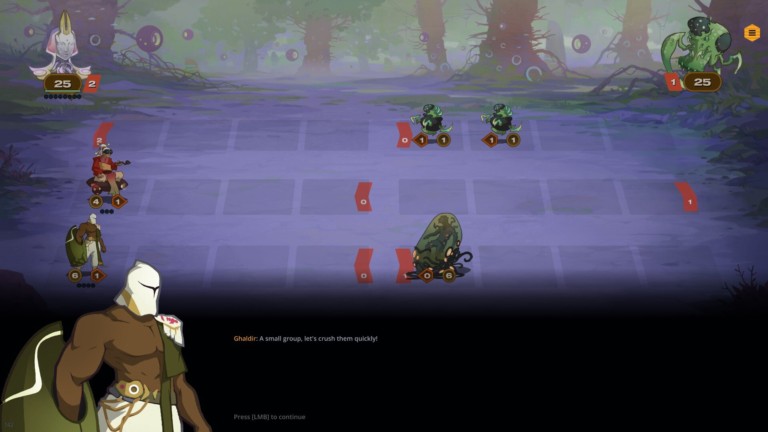
As you progress you get currency. I don’t even remember what they call it. “MetaCubes.” No, wait, “Arcana Cells.” No, those are two different currencies for upgrading stuff. Anyway, you can spend it to upgrade your units; it’s effectively a talent tree. These mutations allow you to modify and improve your units in various interesting ways or add more of a certain type of unit to your “deck.”
You will also control a variety of heroes with special powers that can affect the battlefield or your deck: something we have seen bajillion times, but merits mention.
Real Innovations, Not Just an Arcane New Coat of Paint
Despite all my comparisons to its progenitors, there are many clever and increasingly complex combinations contriving to calibrate your colossal conflict. Opposing units may grow in power as you place more friendly units. Other enemies might suffer damage the more rounds they last.
There are a wide variety of synergistic or discordant combinations to explore. This is Against the Moon’s great strength: a variety of combinations that starts to become increasingly rich.
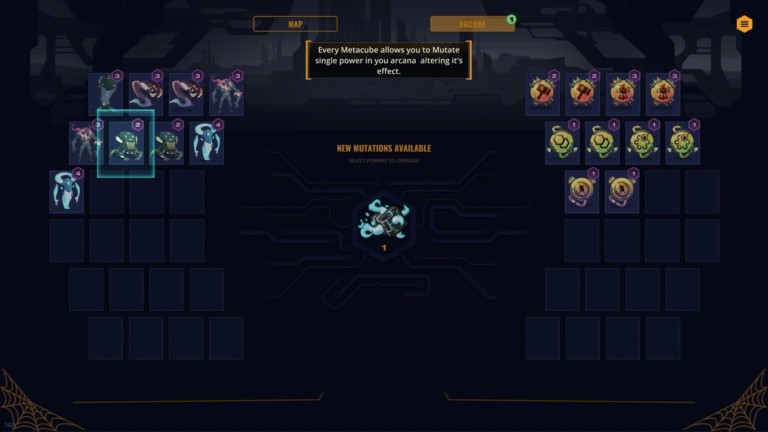
Additionally, the game does not use summoning sickness to slow things down. You can both spawn and attack. And unlike some games, where only the forward line attacks, the entire lane cumulatively attacks here, with no obstacles from behind which your attack numbers get nerfed. You can place shield units, however, and they also tend to do some damage.
In the end, the game is a surprising bunch of combat scenarios with a cumbersome story sandwiched in between levels. If it weren’t for the fact that I have about three years of Star Wars: Galaxy of Heroes behind me (not to mention too many impulsive microtransactions), this might feel more extraordinary.
Almost a Moonshot
Also, you will quickly discover that only the prologue is voiced, and it is short. The rest of the game merely uses text to create variety and context, with no other aural indicators. I was surprised – but maybe not really – to see that the game is actually out of Early Access, despite how unfinished it feels. A new campaign came out at Halloween to extend the game, but again, I wonder about the larger content strategy here.
All told, I don’t hate this game; to the contrary, I actually think it’s challenging and rife with ideas. I don’t want to be too harsh on the developers, and in fact, my critiques come from a loving place, because I WANT this package to be better and succeed.
Though I don’t forgive its trespasses, there is something here. It does appear as though they ran out of time, money or energy, though, even though they are clearly near the finish line. Maybe it was more ambitious than they could manage. It’s an RPG adventure, Rogue-lite, lane-based, deck-building, actor-voiced, divergent talent-tree, huge-map thing.
Despite literally writing its influences on its marketing sleeve, Against the Moon still manages to be a pretty nice fusion of a lot of things I like, with very nice animated cartoon sprites and a solid soundtrack. With a little more polish and tuning, it could sneak onto the edges of my long-term playlist.
Against the Moon is available via Steam.
Check out the official trailer for Against the Moon below:

